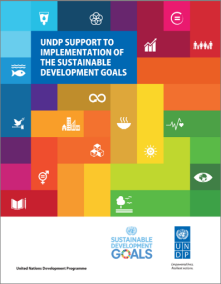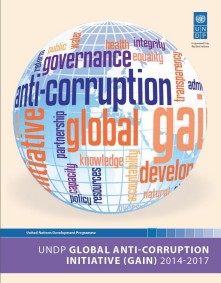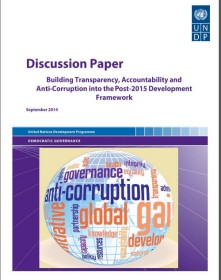UNDP Support to the Implementation of the Sustainable Development Goals
August 2014
There is an imperative today to foster sustainable development. A vision for what this encapsulates is laid out in the new sustainable development agenda that aims to end poverty, promote prosperity and people’s well-being while protecting the environment by 2030. As the UN’s Development arm, UNDP has a key role to play in supporting countries to make this vision a reality—putting societies on a sustainable development pathway, managing risk and enhancing resilience, and advancing prosperity and wellbeing.
Building on its core strengths—a large country network in more than 170 countries and territories, a principal coordination role within the UN Development System, and the proven ability in supporting efforts to reduce poverty, inequality and exclusion, and protect vital ecosystems—UNDP has outlined a vision in its Strategic Plan 2014-17 focused on making the next big breakthrough in development: to help countries achieve the simultaneous eradication of poverty and significant reduction of inequalities and exclusion. While ambitious, this vision is within reach and significant inroads can be made in eradicating poverty, reducing inequalities and exclusion, and safeguarding the environment.
In line with this vision, UNDP has worked with the United Nations Development Group (UNDG) in developing a strategy for effective and coherent implementation support of the new sustainable development agenda under the acronym ‘MAPS’ (Mainstreaming, Acceleration, and Policy Support). The Mainstreaming component of MAPS aims to generate awareness amongst all relevant actors and help governments land the agenda at national and local levels; and ultimately to mainstream the agenda into their national plans, strategies and budgets. The Acceleration component focuses on helping governments accelerate progress on Sustainable Development Goal (SDG) targets, by providing tools that will help identify critical constraints to faster progress and focus on those development objectives that are more relevant to the country context. The Policy Support component aims to provide coordinated and pooled policy support to countries working to meet their SDG targets. In this regard, UNDP offers an integrated package of policy support services that align with its programming priorities. These services, as outlined in the prospectus, cover a wide range of areas: poverty reduction, inclusive growth and productive employment, gender equality and the empowerment of women, HIV and health, access to water and sanitation, climate change adaptation, access to sustainable energy, sustainable management of terrestrial ecosystems, oceans governance, and promotion of peaceful and inclusive societies.
Well-equipped with this integrated package of policy support services, UNDP stands ready to support country partners to effectively implement the new development agenda and make long-term economic prosperity, human and environmental well-being a reality.



